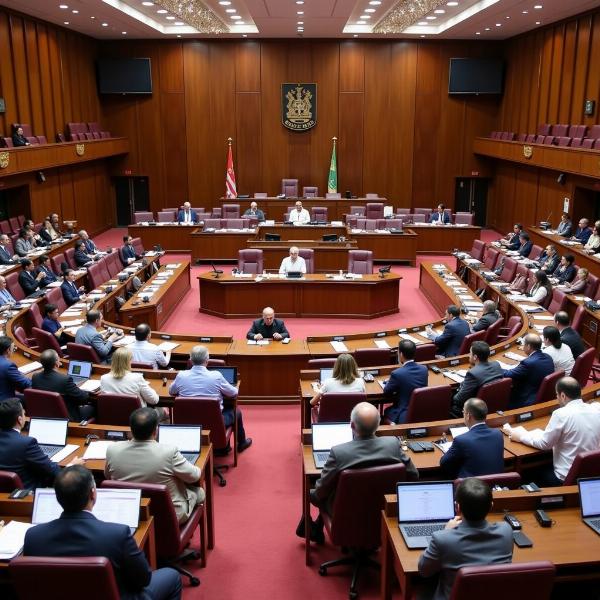Understanding the meaning of “legislative assembly” in Hindi is crucial for anyone interested in Indian politics and governance. This article provides a comprehensive explanation of the term, its significance, and related concepts, catering specifically to an Indian audience. We’ll explore various Hindi equivalents, their nuances, and their usage in different contexts.
What Does “Legislative Assembly” Mean in Hindi?
The most common Hindi translation for “legislative assembly” is विधान सभा (Vidhan Sabha). This term is widely understood and used across India. It signifies the lower house of the state legislature, a body responsible for making laws for the state. Other terms like विधान मंडल (Vidhan Mandal) refer to the entire state legislature, encompassing both the Vidhan Sabha and the Vidhan Parishad (Legislative Council), where it exists.
Understanding the Role of the Vidhan Sabha
The Vidhan Sabha is the primary law-making body in a state. Its members, known as MLAs (Members of the Legislative Assembly), are elected by the people. They represent different constituencies and voice the concerns of their constituents in the assembly. The Vidhan Sabha plays a vital role in shaping state policies, allocating budgets, and holding the executive accountable.
Key Functions of the Legislative Assembly
- Lawmaking: The Vidhan Sabha debates and passes laws pertaining to the state.
- Budgetary Control: It scrutinizes and approves the state budget.
- Executive Oversight: It holds the state government accountable for its actions.
- Representation: MLAs represent the interests of their constituents.
 Image of a Vidhan Sabha in session
Image of a Vidhan Sabha in session
Vidhan Sabha vs. Vidhan Parishad
Some states in India have a bicameral legislature, meaning they have two houses: the Vidhan Sabha and the Vidhan Parishad. The Vidhan Sabha, being the lower house, is more powerful. It has the sole authority to pass money bills. While the Vidhan Parishad can review legislation, the Vidhan Sabha can override its recommendations. The existence and powers of the Vidhan Parishad vary across states.
The Importance of Aamdars (MLAs)
Aamdar meaning in hindi translates to Member of the Legislative Assembly. They are the elected representatives of the people and play a crucial role in bridging the gap between the government and the citizens. They bring local issues to the forefront and work towards their resolution.
Responsibilities of an MLA
- Representing the constituency in the Vidhan Sabha.
- Raising issues concerning their constituents.
- Participating in legislative debates and voting on bills.
- Monitoring government schemes and ensuring their effective implementation.
The Role of the Presiding Officer
The Presiding Officer of the Vidhan Sabha, also known as the Speaker, maintains order and decorum during assembly sessions. They preside over debates, ensure adherence to rules, and facilitate the smooth functioning of the legislative process. The Speaker’s impartiality is crucial for upholding the democratic principles of the Vidhan Sabha.
Conclusion
“Legislative assembly,” referred to as विधान सभा (Vidhan Sabha) in Hindi, is a fundamental pillar of Indian democracy. Understanding its functions and the roles of its members is essential for informed civic participation. The Vidhan Sabha, with its elected representatives, plays a pivotal role in shaping state policies and ensuring good governance.
FAQ
- What is the difference between Lok Sabha and Vidhan Sabha? The Lok Sabha is the lower house of the Indian Parliament (national level), while the Vidhan Sabha is the lower house of the state legislature.
- How are MLAs elected? MLAs are elected by the people through direct elections in their respective constituencies.
- What is the term of a Vidhan Sabha? The term of a Vidhan Sabha is usually five years, unless dissolved earlier.
- Who can vote in Vidhan Sabha elections? All Indian citizens above the age of 18, residing in the respective constituency, are eligible to vote.
- Can the Vidhan Sabha be dissolved before its term ends? Yes, the Vidhan Sabha can be dissolved by the Governor on the recommendation of the Chief Minister, or by the President’s rule.
- What is a “hung assembly”? A hung assembly occurs when no single party achieves a majority to form the government.
- What is the role of the opposition in the Vidhan Sabha? The opposition plays a crucial role in scrutinizing the government’s actions, holding them accountable, and offering alternative policies.
You might also be interested in:
Meaning-Hindi.in is your trusted partner for high-quality Hindi translation and language services. We specialize in various domains, including business, legal, technical, website localization, educational, and specialized translations. Our expert team ensures accuracy, cultural sensitivity, and timely delivery. Whether you need document translation, interpretation, or other language solutions, Meaning-Hindi.in is here to help. Contact us at [email protected] or call us at +91 11-4502-7584 to discuss your requirements and get a free quote.